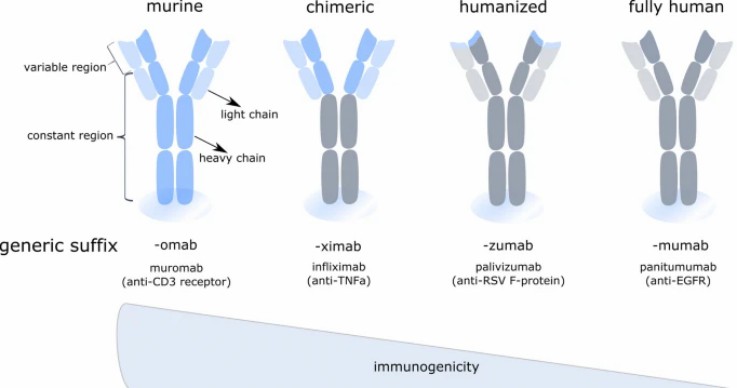Sequence Variation Identification Between Monoclonal Antibodies and Generic Drugs
- Home
- Services
- Antibody Sequencing
- Mass Spectrometry Based Antibody Sequencing
- Sequence Variation Identification Between Monoclonal Antibodies and Generic Drugs
Service Details
Patent expiration of first-generation biologics and the high cost of innovative biologics are 2 drivers for the development of biosimilar products. However, recombinant monoclonal antibodies (mAbs), either native or recombinant, are amenable to post-translational modifications (PTMs), including signal peptide processing, glycosylation, phosphorylation, C-terminal lysine truncation. Additionally, chemical modifications (e.g., oxidation, deamidation, isomerization, modification by reactive metabolites in cell culture), clipping and aggregation can arise during expression, recovery, purification and storage in the final formulation. Besides PTMs, sequence variants can be introduced during the translation step of the protein in the host system, as unintended amino acid substitution, and can lead to increased product microheterogeneity. The degree of PTMs and variants for these mAbs may differ between host cells, culture systems, downstream processes and formulations. As a result, the identification of sequence variants between an originator and a biosimilar product is the basis for ensuring the efficacy of generic drugs.
 Fig.1. Overview of monoclonal antibody
variants used in therapy. (Hoecke L V, et al., 2019)
Fig.1. Overview of monoclonal antibody
variants used in therapy. (Hoecke L V, et al., 2019)
Creative Proteomics has developed an LC-MS-based antibody sequencing platform to provide customers with accurate generic drug antibody sequencing services. Our software program for automated LC-MS data processing and evaluation enables rapid characterization of protein identity, 100% full sequence coverage of these products, and 100% guaranteed antibody sequence accuracy, boosting the development of customers' antibody generic drugs. In addition, the mass spectrometry method we developed can be used to study PTM differences between candidate biosimilars and innovator products, enabling the simultaneous identification and quantification of low-abundance impurities, sequence variations and site-specific modifications. Which locates the mass difference between the biosimilar and the innovator to a two amino acid residue variance in the heavy chain sequences.
Apart from primary sequence, it has been established that glycosylation can be critical for the biological function of mAbs. Product-related substances or impurities such as deamidated, isomerized or oxidized forms, or protein aggregates that may be introduced during cloning and production processes can affect both tertiary structure and antigen binding properties of mAbs. Creative Proteomics also provieds biosimilar and glycan analysis services to accelerate your drug development.
At Creative Proteomics, our scientists not only provide professional sequence variation identification between monoclonal antibodies and generic drugs, but also complete PTMs and glycan analysis services. In addition, we can also provide customized services according to your specific requirements and describe them in a detailed project report. Please contact us directly for details about our services.
References
For research use only, not intended for any clinical use.